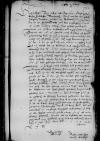 BCz, 1597, p. 703
BCz, 1597, p. 703
Hochwirdiger inn Gott, gnediger Herr.
Nach gebürlicher dinstlicher reverentz, / auch wunsch aller geluckselligenn(n) wolfarth. /
Wil ich derselbenn(n) nit vorhaltenn(n), das ich ihr schreybenn(n) als heut dato empfangenn(n), / doraus ich nuchts sunders alleinn(n), denn(n) althenn(n) genedigenn(n) willenn(n) mit sunderer danckbarkeit und ergetzung vornumenn(n). Dennoch aber E(wer) F(ürstliche) Wirde meld(en), / derselbenn(n) erst schreibe(n) zubeantwort(en) / kann(n) ich mich in warheÿt nicht erinnernn(n), / das inderth ein schreÿbenn(n) so E(wer) G(naden) nicht beantwort bey mir zu dem, / so bin ich itzund alss eynn(n) hauswirt in meinem(m) dorff und nit behoffe, das ich derselbenn(n) briff ubersehe, / und mich belerntenn(n) was E(wer) F(ürstliche) W(irde) unbeantworth, so kan ich auch achte(n) es seÿ so gar viel dorann(n) nicht gelegenn(n), wie dieselbige fernner neue tzeytung zu wissenn(n) begerenn(n), / ich kann disser tzeyt nichts bessers wissenn(n), / alleynn(n) das unser genediger Sigismund I Jagiellon (Zygmunt I) (*1467 – †1548), King of Poland and Grand Duke of Lithuania (1506-1548); Duke of Głogów (Glogau) (1499-1506), Duke of Opava (1501-1506), Governor of Silesia (1504-1506); son of King Kazimierz IV Jagiellon and Elisabeth of Austria⌊alter kunigkSigismund I Jagiellon (Zygmunt I) (*1467 – †1548), King of Poland and Grand Duke of Lithuania (1506-1548); Duke of Głogów (Glogau) (1499-1506), Duke of Opava (1501-1506), Governor of Silesia (1504-1506); son of King Kazimierz IV Jagiellon and Elisabeth of Austria⌋ widerumb zu besser gesuntheyt kommenn(n), / auch das es vonn(n) alle(n) ahrthenn(n) in sunderheÿt vonn(n) The Ottoman Turks (Turcae) ⌊Turckenn(n)The Ottoman Turks (Turcae) ⌋ und The Tatars ⌊Thatternn(n)The Tatars ⌋ schylle unnd eÿnes fridlichenn(n) summers zuvormuthenn(n). / Dis mall nit mehr denn(n) ich bin beÿ viertzehenn(n) tagenn(n) beÿ hoffe nicht gewest zu dem so bin ich, / am beÿb disser tzeyt was ungeschickt. / Derwegenn(n) ich bit meÿns wenniges schreybenn(n) entschuldiget zu habenn(n) sein.
E(wer) Wirdenn diener Mauritius (Moritz), at least in 1537-1547 servant of Ioannes Dantiscus, often sent with letters and packages to the royal court (CIDTC, e.g. IDL 1630, IDL 4476, IDL 3266, IDL 3279)⌊MauritzMauritius (Moritz), at least in 1537-1547 servant of Ioannes Dantiscus, often sent with letters and packages to the royal court (CIDTC, e.g. IDL 1630, IDL 4476, IDL 3266, IDL 3279)⌋ hatt mir aus der sthat zeytunge mit raus bracht, / wie das der Hans Katzianer (*1490 – †1539)⌊KatziannerHans Katzianer (*1490 – †1539)⌋ mit seynn(n) festenn(n) schlossernn(n) solt zum Turcke(n) gefallenn seinn(n), / wiewoll mir seynn(n) freuntschafft zuvor ehr es gescheenn(n) der gleichenn(n) drew worth geschribenn(n), / doch kann(n) ichs so gar nicht gleubenn(n), / doch ist es muglich ist was dorann(n) so ist es keynn(n) schertz, / und viel mehr ein grosser schade gemeynner Christennheyt, / unnd sunderlich rom(isch) kon(iglicher) m(aiest)at erblandenn(n) ein mergklicher nochtheÿll und schadenn(n), so balde ich aber desfalss warenn(n) grundt erlange, / sol E(wer) G(naden) unvorhaltenn(n) bleybenn(n).
Hirmit hab ich dieselbenn(n) dem Almechtigenn(n) und mich derselbenn(n) gantz dinstlich befolhlenn(n). /


 BCz, 1597, p. 706
BCz, 1597, p. 706